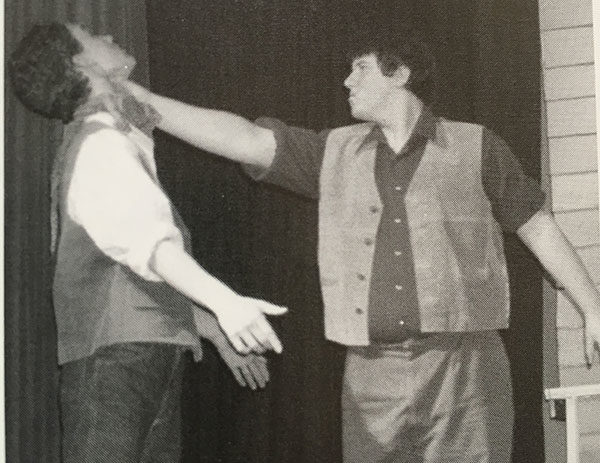Before going to law school and becoming a professional advocate I had plans to change the world one performance at a time. When I was growing up, my parents ran a professional summer theater in southern Vermont. There I was lucky enough to get hundreds of hours of professional stage time before getting a degree in theater and touring New England doing children’s theater.
One of the core beliefs that I brought to my work as an actor was that there are no good guys and no bad guys, just people. Said another way, most people see themselves as the heroes of their own story, very few people see themselves as the villain, and you have to play characters as such. The belief that we need to respect everyone for their humanity is a core principle of the work at Action Circles and is a large component in non-violent communication, but it was something I learned as I tried to get inside the skin of characters who thought and acted differently than I ever would.
You will often hear actors say things like “what is my motivation in this scene?” or “what motivates the character to do that?” These questions are the right ones to ask, both on the stage and when you are trying to make change in the world. Everyone is working to fulfill some need with each of their actions. If you take the time to understand the needs people are trying to fulfill, and how they go about doing it, you can learn a lot. If you don’t classify people as good or bad, and instead look to their motivations, it is easier to understand why people are doing what they are doing and to develop a plan to help you get what you need.

As an actor, one of my favorite things was playing “bad guys.” As someone who is often described as “friendly,” “nice,” or “smiley,” people found this odd, but it was always an amazing experience in walking in someone else’s shoes. The first step in any such role was asking why does this person do what they do, and what needs are they trying to fulfill? By answering these questions you begin to see a person who could exist in the real world, not just a two-dimensional personifications of “bad” or “evil.” Finding a real person with real motivations within a “bad guy” is extremely important as an actor, because you, and the audience, learn more by holding up a mirror to real life than you do holding up a caricature of a mustache-twirling villain.
Finding the human core in a “bad guy” has the added effect of making the characters much more terrifying because the danger they pose feels more real and imminent. The ability to recognize how ordinary people can be motivated to do awful things is part of the reason that we find characters like Travis Bickle from Taxi Driver much scarier than two-dimensional Bond villains with plans of world domination. The Bond villain could cause much more harm with nuclear warheads or death rays, but a character like Bickle makes us look at ourselves and ask questions about what could drive someone to try and harm to someone they have never even met.
From my experience, It is extremely rare that anyone does anything because they are “bad.” Rather, bad deeds are often the result of people trying to fill a need in a way that ends up hurting people. The fulfillment of needs does not justify all actions or relieve people of responsibility for their actions, but this framework can help us understand people in a different way. If we can imagine people’s motivations, then we can ask ourselves how we can work with or around the person to achieve our goals without demonizing the person or people who are on a different side of the issue than we are.
In my work as a professional advocate, I have seen people too often write others off without taking time to ask what motivates them and what needs are they trying to fulfill. When people have made a clear differentiation between what is right and what is wrong it is easy to dehumanize people who fall on the other side of the line. You can write these people off as evil, greedy, selfish, and corrupt without taking the time to understand their actions from their point of view. Respecting someone’s humanity does not mean that you have to like or respect every action they take, but that you have to respect them as people enough to try and understand why they took the actions they did. The better we can understand the motivations of those around us, the easier it is to find areas of common interest that allow us to move forward. Sometimes you will not be able to find common ground, but respecting the humanity of your opposition will give you insight into how you can best neutralize their efforts, and ultimately help you get to the best outcome.
